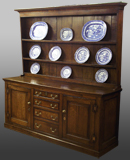 England’s generally rich soil and its comparatively mild and moist climate have provided it with an abundance of trees ideal for use as timber. English oak is a beautiful wood; it tends to have a fine and close grain, and hardens with age to an iron-like strength. Medullary rays are a particularly characteristic feature of oak, winding across the grain, usually paler than the surrounding wood. These are small bands of cells which conveyed and stored nutrients horizontally.
England’s generally rich soil and its comparatively mild and moist climate have provided it with an abundance of trees ideal for use as timber. English oak is a beautiful wood; it tends to have a fine and close grain, and hardens with age to an iron-like strength. Medullary rays are a particularly characteristic feature of oak, winding across the grain, usually paler than the surrounding wood. These are small bands of cells which conveyed and stored nutrients horizontally.
In England, well into the 19th century, the commonest method of converting timber into planks was by means of a long saw with a handle at each end, worked by two men, one of whom would often be standing below the log in a pit. Such timber is known as “pit-sawn”, and the unfinished back or interior boards of many a piece of furniture show its distinctive parallel saw marks.
The most obvious method of converting a log into planks is simply to slice it into parallel layers; This is known as plain sawing, and gave rise to the expression “run of the mill”. In order to produce planks with the sought-after medullary figure, the log would be “quarter-cut”: it was first divided lengthwise into quarters, then planks were sawn from each quarter. Boards created this way are also less likely to warp, and were used as show wood.
This lovely oak dresser dates from the second half of the 18th century, and has a lovely colour and old wax patina. The panelled doors display the typical medullary figuring of quarter-cut oak .`